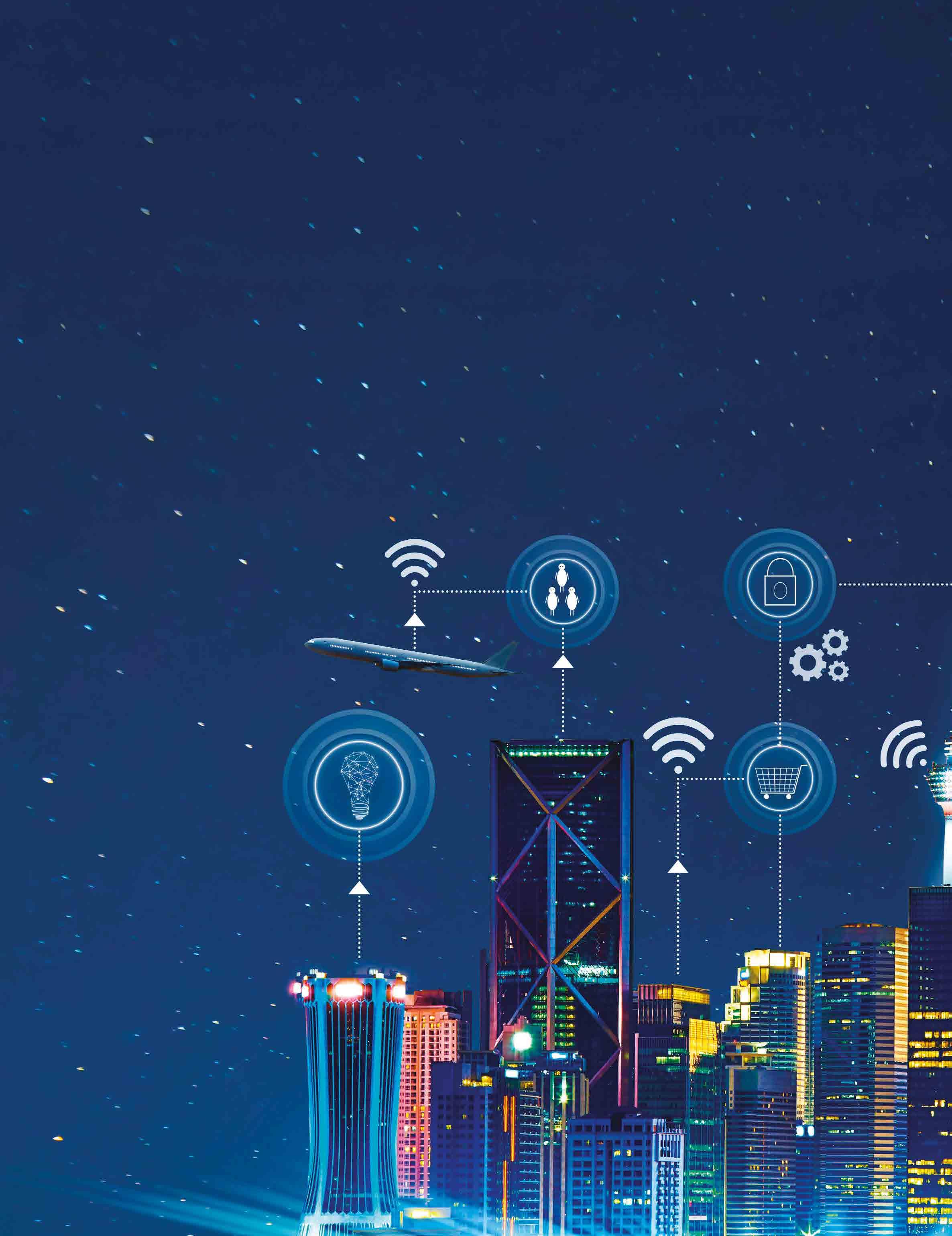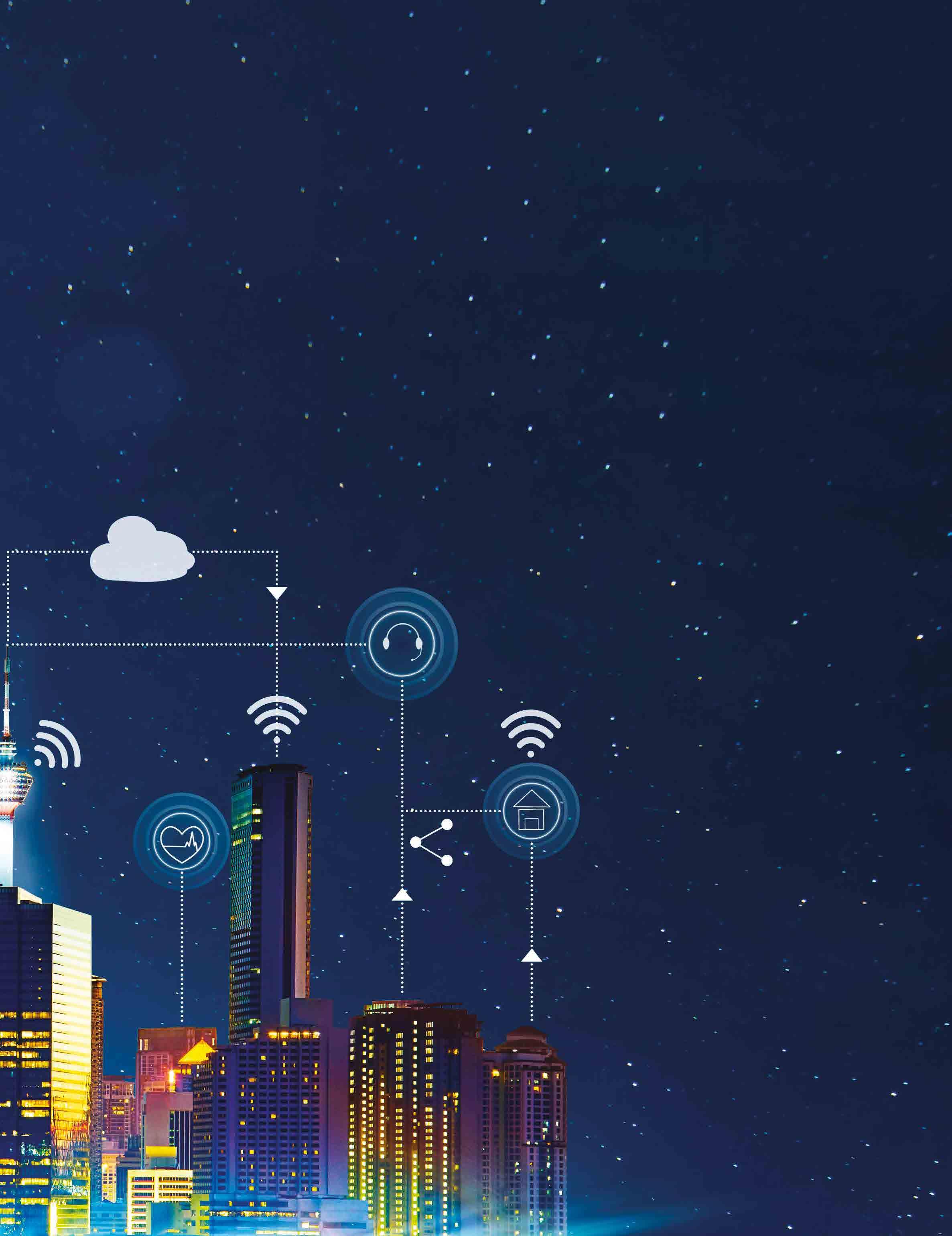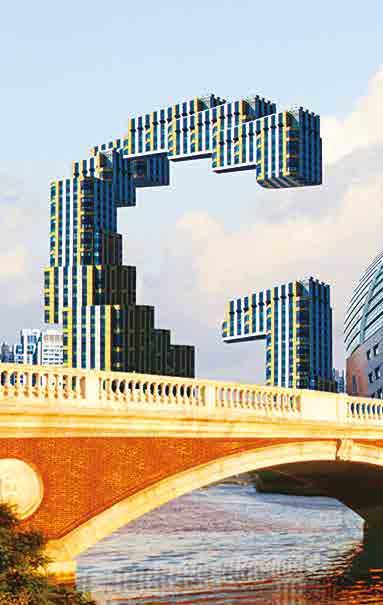
12 minute read
Teknoloji Technology Akllı Şehirler
YÜKLENİYOR... AKILLI ŞEHİRLER LOADING... SMART CITIES
Bugün toplumu etkileyen en önemli güçlerden biri kentleşme. Birleşmiş Milletler’in tahminine göre dünya kentsel nüfusu 2050 yılına gelindiğinde iki katına, küresel nüfus ise 7 milyardan 10 milyara ulaşacak. Şu anda dünya nüfusunun yarısı kentlerde yaşıyor. Dünyanın 25 mega şehri, global servetin yarısını oluşturuyor. Küresel nüfusun yüzde 10’u 30 büyük metropolde yaşıyor ve bu 30 mega kentin GSYİH’si globalin yüzde 20’sini barındırıyor. Dünya şehirleri, küresel enerji üretiminin yüzde 60-80’ini harcıyor. Tüm bu veriler, gelecekte herkes için yaşanabilecek sürdürülebilir bir ortam yaratmak adına bugünden şehirler üzerinde çalışmalara başlanması gerektiğini gösteriyor. Bu da ortaya “akıllı şehir” kavramını atıyor.
Advertisement
Gelecekteki şehirler nasıl planlamalı ve tasarlanmalı? Nasıl bir altyapı insanların yaşam kalitesini daha da artırabilir? Gelecekte hangi akıllı çözümler daha temiz ve sürdürülebilir bir şehir hayatı sağlayabilir? Ve en önemlisi bir şehri akıllı yapan ne, bu kavramdan ne anlıyoruz?

One of the most important forces affecting society today is urbanization. According to the forecast of the United Nations, the urban population of the world will double by 2050, and the global population will increase from 7 billion to 10 billion. Currently, half of the world’s population lives in cities. 25 mega cities of the world make up half of the global wealth. 10 percent of the world’s population lives in 30 major metropolises, and the GDP of these 30 mega cities hosts 20 percent of the global population. World cities spend 60-80 percent of global energy production. All these data show that works should be started on cities today to create a sustainable environment for everyone in the future. This brings up the concept of “smart city”.
How should future cities be planned and designed? What kind of infrastructure can increase people’s quality of life even more? What smart solutions can provide a cleaner and sustainable city life in the future? And most importantly, what makes a city smart and what do we understand from this concept?
Kent sakinlerinin yaşamlarının daha kaliteli ve sürdürülebilir olmasını sağlamak ve verimliliği artırma ihtiyacı, şehirleri yeni teknoloji ve yenilikçi yaklaşımları değerlendirmeye yönlendirdi. Bu motivasyonun sonucunda ortaya çıkan kavram ise akıllı şehirler. Geleceğin şehirleri söz konusu olduğunda son konsept olan bu tekno şehirler, yaşam tarzına yeni bir kimlik kazandırma vizyonu taşıyor. The need to increase the efficiency and sustainability of the lives of the residents and to increase efficiency has led the cities to evaluate new technologies and innovative approaches. The concept that emerged as a result of this motivation is smart cities. These techno-cities, which are the latest concept when it comes to the cities of the future, have the vision of giving a new identity to the lifestyle.
FÜTÜRISTIK BIR VIZYON
Bugünün şehirleri, artan nüfus, fiziksel ve sosyal altyapı eksikliği, çevresel ve düzenleyici gereklilikler, azalan bütçeler ve artan maliyetler gibi zorluklarla karşı karşıya. Kentsel yaşamın karmaşıklığını yönetmek; kirlilik, aşırı kabalalık, kentsel yayılma sonucu oluşan konut yetersizliği, yüksek işsizlik, kaynak yönetimi, çevre koruma ve artan suç oranlarına kadar çeşitlenen sorunları tanımlamayı ve çözümlemeyi gerektiriyor. Tüm bunlara bütünsel şekilde cevap verebilmek de gelecekteki fırsatlardan en iyi şekilde yararlanabilmeyi gerektiriyor. Akıllı şehir kavramı da bu gelişmiş ve modern kentleşme vizyonunu uygulamak için en uygun çerçeve olarak görülüyor.
Akıllı şehir; vatandaşlara sosyal aktivite sağlamak, şehir hizmetleri sunmak ve kentsel sistemleri bilgi, iletişim teknolojileri çerçevesinde geliştirmeyi hedefleyen bir terim. En son teknolojilerin bir araya geldiği ekosistemlerden oluşan akıllı şehirlerde sensörler, ağ geçitleri, iletişim altyapısı ve sunucular gibi çeşitli cihazlar, geleceğin yaşam alanlarını şekillendirme noktasında kritik bileşen olarak “nesnelerin interneti”ni kullanıyor.
Geleceğin şehirlerini inşa etmek söz konusu olduğunda akıllı şehirler son konsept. Bu teknolojik şehirler, yaşam tarzına yeni bir kimlik kazandırmak ve benzersiz deneyimler katmak için sürdürülebilir bir geleceği, ekonomik büyüme ve istihdam yaratma ile birleştirmenin anahtarı olarak görülüyor.
ŞEHİRLERDE KÜRESEL SAHNE
Küresel kentleşme eğilimi, beraberindeki zorlukları yönetmek için daha akıllı yollar bulma aciliyeti yaratıyor. Diğer yandan küresel iklim değişikliğinin beraberinde getirdiği sorunlar, ülkeleri stratejiler geliştirmeye itiyor. Sürdürülebilir şehirler, ekolojik kentsel gelişim için
A FUTURISTIC VISION
Today’s cities are facing challenges such as increased population, lack of physical and social infrastructure, environmental and regulatory requirements, reduced budgets, and increased costs. Managing the complexity of urban life, it requires identifying and resolving problems ranging from pollution, overcrowding, and lack of housing resulting from urban sprawl, high unemployment, resource management, environmental protection and increased crime rates. Being able to satisfy all of these in a holistic way requires making the most of the future opportunities. The concept of smart city is seen as the most suitable framework to implement this advanced and modern urbanization vision.
Smart city is a term that aims to provide social activities and city services to citizens and to develop urban systems within the framework of information and communication technologies. Various devices such as sensors, gateways, communication infrastructure and servers are actualizing the “internet of things” as the critical component in shaping the living spaces of the future in smart cities, where ecosystems and the latest technologies come together.
Smart cities are the latest concept when it comes to building cities of the future. These technological cities are seen as the key to combining a sustainable future with economic growth and job creation to give a new identity to life and to add unique experiences.
GLOBAL STAGE IN SMART CITIES
The global urbanization trend creates the urgency to find smarter ways to manage its accompanying challenges. On the other hand, the problems brought about by global climate change are pushing countries to develop strategies. Sustainable cities have become a desirable destination for ecological urban development. These and similar challenges
arzulanan bir hedef haline geldi. Bu ve benzeri zorluklar dünyadaki pek çok şehri; nesnelerin interneti, blockchain, yapay zeka, big data gibi dijital oluşumlar ışığında akıllı yollar bulmaya daha da zorluyor.
İnternetin bugün ulaştığı noktada yaşadığımız şehirlerin de bir yere kadar “akıllı” olabileceğini söylemek mümkün, hedef bunu daha da ilerletmek. Şehirlere yönelik altyapı yatırımının önümüzdeki 20 yıl boyunca yaklaşık 30-40 trilyon olması bekleniyor. 2020’li yılların sonuna kadar ise 40’tan fazla küresel kentin akıllı şehre dönüşmesi öngörülüyor. Daha şimdiden Güney Kore’deki Songdo, Barselona ve Orlando’nun (ABD) Nona Gölü bölgesi akıllı şehir formatında hareket etmeye başladı. Rutin süreçleri otomatikleştiren bu bölgeler, bilgi teknolojisi, ağ iletişimi ve sensörlerle, işlevlerde ve süreçlerde dramatik bir verimlilik, maliyet tasarrufu ve yaşam kalitesi artışı sağlıyor. Bunların yanı sıra Berlin, Kopenhag, Paris, Amsterdam, Toronto, Singapur, Sidney, Tokyo, Hong Kong, New York, Boston, Stockholm gibi şehirler de kendilerini hızla teknolojik olarak güncelliyor.
Ancak hayal ettiğimiz şekilde akıllı şehirlerin ortaya çıkması elbette bundan çok daha fazlası; sürücüsüz araçlar, uçan arabalar, birbiri ile konuşan makineler, ultra yüksek hızda internet, azaltılmış karbon ayak izi bu şehirlerin birer parçası olacak. Tüm bunların varlığı da altyapı sistemlerinin daha da geliştirilmesine, daha fazla prototipe ve elbette ekonomik kaynağa ihtiyaç duyuyor. Bunlar sadece hükümetlerin kontrolünde gelişebilecek sistemler değil. Bu sebeple, tüm insani hareketleri rakamsal verilere dönüştürebilme yeteneğine sahip olan dünyanın önde gelen firmaları geleceğin şehirlerini yaratmak adına çalışmalarına başladı. Henüz planlama aşamasında olan bu şehirlerin önümüzdeki 10-15 sene içinde gerçeğe dönüşmesi durumu ise bir hayalin ötesinde duruyor.
ÜTOPIK İDEALLER GERÇEK KENTE DÖNÜŞTÜRÜLEBILIR MI?
Söz konusu geleceğe yönelik en ufak bir ışıldama veya ihtimal olduğunda, dünyanın önde gelen markaları bunu gerçeğe dönüştürmek için anında start tuşuna basıyor; en iyisini yapmak için birbirleri ile yarışa başlıyor. Akıllı şehirler için de durum farklı değil. Google, Microsoft, Facebook ve Japon otomobil devi Toyota yüksek teknolojili şehirlerini inşa etmek için çalışmalara koyuldu.
Geleceğin şehri fikri, son zamanlarda insanların hareket etme şeklini değiştirmek için yeni teknolojiler include many cities in the world; The Internet of Things makes it even more difficult to find smart ways in the light of digital formations such as blockchain, artificial intelligence, big data.
It is possible to say that the cities where we live at the point where the internet reaches today can be “smart” to some extent, the goal is to improve this. Infrastructure investments in cities are expected to be approximately 30-40 trillion over the next 20 years. By the end of the 2020’s, more than 40 global cities are expected to turn into smart cities. Songdo in South Korea, the Nona Lake region of Barcelona and Orlando (USA) has already begun to function in a smart city format. These regions, which automate routine processes, with information technology, networking and sensors, functions and provide a dramatic increase in efficiency, cost savings and quality of life. In addition to these, cities such as Berlin, Copenhagen, Paris, Amsterdam, Toronto, Singapore, Sydney, Tokyo, Hong Kong, New York, Boston, and Stockholm are rapidly updating themselves.
But the emergence of smart cities as we imagine is of course much more than that; driverless vehicles, flying cars, talking machines, ultra-high speed internet, reduced carbon footprint will be a part of these cities. The existence of all of these needs further development of infrastructure systems, more prototypes and, of course, economic resources. These are not just systems that can develop under the control of governments. For this reason, the world’s leading companies, which have the ability to convert all human movements into numerical data, have started their work to create the cities of the future. The fact that these cities, which are still in the planning stage, become reality within the next 10-15 years is beyond a dream.
CAN UTOPIC IDEALS BE TRANSFORMED INTO REAL CITY?
When it comes to the slightest luminescence or possibility for the future, the world’s leading brands press the start button instantly to make it a reality; they start racing with each other to do the best. The situation is no different for smart cities. Google, Microsoft, Facebook and Japanese auto giant Toyota are working to build their high-tech cities.
The idea of the city of the future has become one of the priorities of Japan’s strong car manufacturer brand Toyota, which has recently started to be repositioned as a company that focuses on producing new technologies to change the way people move. The company announced that it will build the 175-acre high-tech, sensor-laden metropolis “Woven City” at the foot of Mount Fuji. The project will start in 2021, and when the city is completed, it will serve as a
üretmeye odaklanan bir şirket olarak yeniden konumlanmaya başlayan Japonya’nın güçlü otomobil üreticisi Toyota’nın öncelikleri arasına girmiş durumda. Şirket, 175 dönümlük yüksek teknolojili, sensör yüklü metropolü “Woven City”yi Fuji Dağı’nın eteklerine inşa edeceğini açıkladı. Proje 2021 yılında başlayacak ve şehir tamamlandığında, Toyota’nın en yeni akıllı teknolojileri için yaşayan bir laboratuvar işlevi görecek. Şehirdeki binalar, araçlar ve insanlar her türlü sensör aracılığıyla birbirleriyle konuşabilecek ve evler, insanların çöplüğünden sağlıklarına kadar her şeyi izleyen yapay zeka yardımcılarıyla donatılacak. Şehrin iklim etkisini hafifletmek için, binalar betondan daha az karbon etkisine sahip ahşaptan yapılacak ve tüm ekosisteme hidrojen yakıtı ile güç verilecek. Bu yeni teknolojilerin birçoğu şimdiden dünya çapındaki çeşitli Toyota laboratuvarlarında çalışılıyor. Woven City ise tüm bunların bir arada test edileceği yer olacak.
Toyota’nın bu tutkusu bir süredir Google tarafından da üzerinde çalışılan teknolojik hamlelerden biri. Dünya devi, bu hamlesini hayata geçirmek için Kanada’nın Toronto şehrini seçmiş durumda. Proje aslında Google’a bağlı kentsel yenilik şirketi Sidewalks Labs’a ait. Bu arada şirketin fütüristik şehirler oluşturmak için arazi satın almayı istediği tek yer Toronto değil, farklı şehirler gezilerek arsalar bakılıyor. Bu şehirlerden biri de New York. Şirketin amacı, ekonomik olarak mücadele eden şehirlerin parçalarını bir araya getirerek, gelecekteki şehirler için kalıcı ve kesin çözümler sunan bir zemine dönüştürmek. Akıllı şehir, sürücüsüz araçlardan suyu, elektriği dağıtmanın daha etkili yollarına kadar her şeyi, test etmek için alan sağlayacak.
Bill Gates de kendi akıllı şehrini kurmak için ilk adımı attı ve ABD’nin Arizona eyaletinde büyük bir arazi satın aldı. Geleceğin kentine daha şimdiden 80 milyon dolar yatırım yapılmış durumda. Ofis ve inovasyon merkezlerine sahip olacak kentin okul ve şahsi mülkler de barındırması bekleniyor. Belmont ismi verilecek olan akıllı şehrin; insansız taşıma, iklim esnekliği ve geniş yeşil alanlar gibi özellikler içermesi ve yüksek hızlı internet, yüksek teknolojili üretim tesisleri ve sensörlere sahip olması planlanıyor.
Facebook’un kurucusu ve CEO’su Mark Zuckerberg ise kendi adını taşıyan şehri için ABD’nin Kaliforniya şehrindeki Menlo Parkı’nı seçti. Gerçekliğe yeni bir dijital katman eklemek isteyen Zuckerberg, yeni şehri “Zuckerberg”in altyapısının sosyal bir ağa sahip olacağını açıkladı. Zuckerberg, veri artışı sağlayarak, insanlara en üst düzey yaşam kalitesi sunmayı amaçlıyor.

living laboratory for Toyota’s latest smart technologies. The buildings, vehicles and people in the city will be able to talk to each other through all kinds of sensors, and the houses will be equipped with artificial intelligence assistants who monitor everything from people’s dumps to their health. To alleviate the climate of the city, buildings will be made of wood with less carbon impact than concrete, and the entire ecosystem will be powered by hydrogen fuel. Many of these new technologies are already being studied in various Toyota laboratories worldwide. Woven City will be the place where all of these will be tested together.
This passion of Toyota has been one of the technological moves that Google has been working on for some time. The world giant has chosen the city of Toronto in Canada to realize this move. The project actually belongs to Sidewalks Labs, an urban innovation company affiliated with Google. Meanwhile, Toronto is not the only place where the company wants to buy land to create futuristic cities, but different cities are visited and the lands are searched. One of these cities is New York. The aim of the company is to
Dünyanın önde gelen isimlerinden Bill Gates kendi akıllı şehrini kurmak için ilk adımı attı ve ABD’nin Arizona eyaletinde büyük bir arazi satın aldı. Geleceğin kentine daha şimdiden 80 milyon dolar yatırım yapılmış durumda. Bill Gates, one of the prominent figures in the world, took the first step to establish his smart city and bought a large land in the state of Arizona, USA. 80 million dollars has already been invested in the city of the future.

bring together parts of economically struggling cities and turn them into a ground that offers permanent and precise solutions for future cities. The smart city will provide space to test everything from driverless vehicles to more efficient ways of distributing water and electricity.
Bill Gates took the first step to establish his own smart city and bought a large land in the state of Arizona, USA. 80 million dollars has already been invested in the city of the future. The city, which will have offices and innovation centers, is expected to host schools and private properties. The smart city to be named Belmont; It is planned to include features such as unmanned transport, climate flexibility and large green areas, and high-speed internet, high-tech production facilities and sensors.
Mark Zuckerberg, founder and CEO of Facebook, chose Menlo Park in California, USA for his own city. Wanting to add a new digital layer to reality, Zuckerberg announced that the infrastructure of the new city “Zuckerberg” will have a social network. Zuckerberg aims to provide people with the highest level of quality of life by increasing the data.










